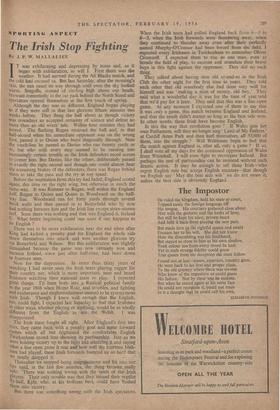SPOUTING ASPECT
The Irish Stop Fig,-itting.
BY J. P. W. MALLALIEU IT was exhilarating and depressing by turns and, as it began with exhilaration, so will 1. First there was the weather. It had snowed during the All Blacks match, and the cold had encased us. But last Saturday, after the morning's rain, the sun eased its way through until even the sky looked warm. Seagulls, instead of circling high above our heads, browsed contentedly in the car park behind the North Stand and spectators opened themselves at the first touch of spring.
Although the day was so different, England began playing as if they were still in that 'last glorious fifteen minutes two weeks before. They flung the ball about as though victory was nowadays an accepted certainty of science and defeat no more than an .old wives' tale. Within four minutes they had scored. The flashing :Regan received the ball and, in that half-second when his immediate opponent was on the wrong foot, passed it to Quinn who burst diagonally through. Near the touch-line he passed to Davies who ran twenty yards or so, but Who with every step seemed to he running into increasingly certain trouble as the Irish defenders raced across to corner .him. But Davies. like the others, deliberately passed at exactly the right second and though one could almost hear the screaming brakes of the defenders, there was Regan behind them to take the pass and the try at top speed.
Before the inspiration from this try had faded, England scored again, this time on the right wing, but otherwise in much the same way. It was Rimmer to Regan, well within the England half, Regan to Quinn and Quinn to Woodward on the half- way line. Woodward ran for forty yards through several brick walls and then passed in to Butterfield who by now had nothing between him and the Irish line except straw-strewn turf. Soon there was nothing and that was England 6, Ireland O. What better beginning could one want if one happens to be English ?
There was to be more exhilaration near the end when after King had kicked a penalty goal for England the whole side threw themselves into attack and won another glorious try via Butterfield and Wilson. But this exhilaration was slightly diminished because the game was now certainly won and because Ireland, since just after half-time, had been down to fourteen men.
Now for the depression. In more than thirty years of watching 1 had never seen the Irish team playing rugger for their country nor, which is more important, seen and heard Irishmen watching their national team so play. I expected great things. I'd been born into a Radical political family in the year 1908 when Home Rule, and troubles, and fighting and exuberance and singlemindedness seemed to be synonymous with Irish. Though I knew well enough that the English, too, could fight, I expected last Saturday to find that Irishmen in other ways, whether playing or watching, would be as wholly different from the English as are the Welsh. I was disappointed.
They talked about having seen old so-and-so in the Irish Club the other night for the first time in years. They told each other that old somebody else had done very well for himself and was ' making a mint of money, old They said what a wonderful day it was for the time of year and that we'd pay for it later. They said that this was a fine open game. At any moment I expected one of them to say that it was only a game, this match between England and Ireland, and that the result didn't matter .so long as the best side won. In other words, these Irish have become English.
Is this the way that revolution goes ? If Wales gets her own Parliament, will they no longer sing ' Land .of My Fathers ' at Cardiff Arms Park and then hurl themselves, all 55,000 of them, into the struggle ? Will Welshmen begin to feel that the match against England is, after all, only a game ? If so, I shall vote all my days for the continued oppression of Wales from Whitehall. I will even fight to reconquer Ireland. But perhaps the zest of partisanship can be restored without such drastic action. It may be enough to tell these Irish—who regret English rule but accept English manners—that though we English say May the best side win ' we do not mean it, unless the best side is obviously England.


































 Previous page
Previous page